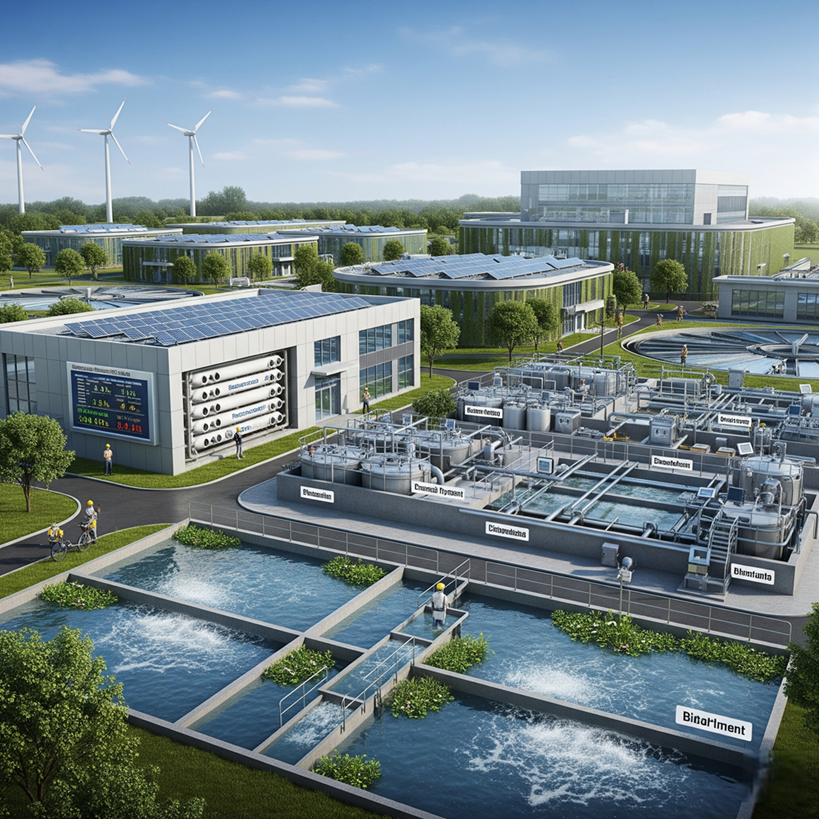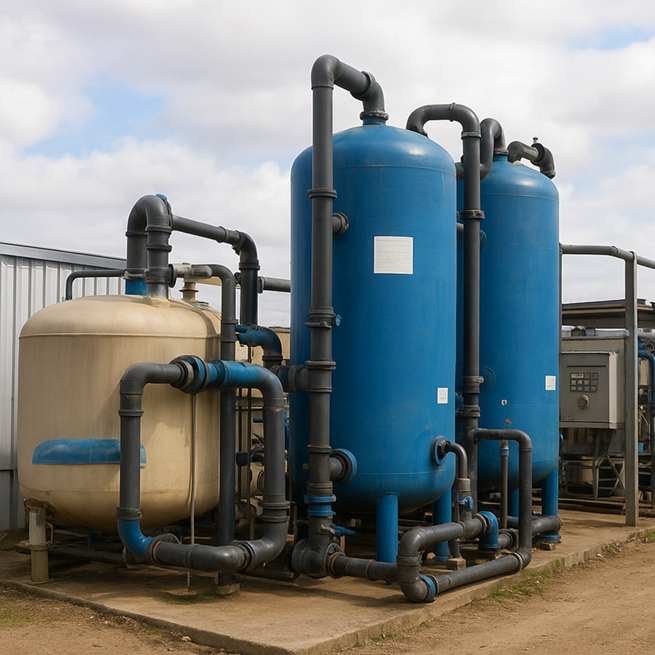
Reasons for the importance of water treatment in the industrial sector
Water treatment is a vital process in the industrial sector, essential for ensuring water quality, protecting public health, and reducing environmental impacts. As industries face increasing water scarcity and stringent regulatory requirements, the importance of effective water treatment has increased. This has prompted a focus on sustainable practices and corporate social responsibility initiatives.
The importance of water treatment is evident in its role in protecting ecosystems and human health from the risks of contaminated wastewater, which can lead to serious illnesses and environmental degradation.
In addition to health and environmental considerations, water treatment contributes significantly to the economic efficiency of industrial operations. By recycling treated water and reducing reliance on raw water sources, industries can reduce operating costs while improving resource utilization.
The Importance of Water Treatment
Water treatment plays a critical role in the industrial sector by ensuring water quality meets regulatory standards and minimizing environmental impact. As industries face increasing challenges related to water scarcity and stringent regulations, effective water treatment has become essential for sustainable operations and corporate social responsibility initiatives.
Health and Environmental Protection
Protecting public health is a primary goal of water treatment by removing harmful contaminants from wastewater before it is discharged into the environment. Contaminated water can lead to serious health problems, including gastrointestinal infections and other diseases caused by pathogens and toxins. Through effective wastewater treatment, industries can prevent these health risks and protect aquatic ecosystems and populations alike.
Economic Efficiency
Implementing water treatment processes can result in significant cost savings for industries. Water treatment and recycling reduce the need to withdraw water from local water sources, reducing operating expenses (OPEX) and capital expenditures (CAPEX) associated with purchasing raw water.
Additionally, treated water can be reused in various industrial applications. This not only conserves resources but also enhances overall operational efficiency.
Equipment Longevity
Water treatment also contributes to the longevity and reliability of industrial equipment. By removing corrosive minerals and impurities, treated water helps extend the life of machinery and reduce maintenance costs associated with repairs and downtime. Reducing microbial growth in systems also reduces the need for frequent cleaning and disinfection, resulting in additional savings.
Resource Conservation
The shift toward wastewater reclamation and reuse reflects a broader trend in the industrial sector aimed at conserving resources. As industries strive to reduce their environmental footprint, effective water treatment enables them to manage water as a precious resource, in line with the Sustainable Development Goals.
By maximizing water recovery, industries can mitigate their impact on local water sources and ecosystems, promoting a more sustainable approach to water use in industrial processes.
Read also: Overcoming Hard Water and Protecting Industrial and Commercial Applications
Industrial Applications of Water Treatment
Overview of Industrial Water Treatment
Industrial water treatment is a critical process used across various sectors to ensure the efficient and safe use of water in manufacturing and other industrial processes. This treatment is essential before and after specific industrial processes, such as preparing water for boilers or cooling towers, and treating wastewater for reuse or disposal in industries such as food, beverage, and automotive.
Key Processes in Industrial Water Treatment
Water treatment in industrial environments involves a range of processes specifically designed to meet the unique requirements of each industry. Common methods include filtration, chemical treatment, and reverse osmosis, which can be customized based on the specific contaminants present and the desired water quality.
- Filtration: Removes sediment, organic matter, and turbidity from water.
- Water Conservation: Reduces water loss due to pollution, enhancing resource efficiency.
- Environmental Protection: Prevents harmful pollutants from entering ecosystems.
- Resource Recovery: Allows the recovery of beneficial by-products, such as methane and natural fertilizers, from sludge.
- Cost Reduction: Simplifies waste disposal, lowering operating costs.
- Regulatory Compliance: Ensures adherence to local and national wastewater treatment standards.
Benefits of Industrial Water Treatment
Enhancing Worker Safety
Effective water treatment systems help improve workplace safety by reducing worker exposure to hazardous substances and decreasing the risk of waterborne diseases. Additionally, many treatment facilities incorporate technologies such as air purifiers to remove harmful gases and odors, contributing to a healthier work environment.
Increased Energy Efficiency
Industrial water treatment contributes to energy efficiency by reducing sedimentation and deposits in heat exchangers. This improvement enhances heat transfer efficiency and can lead to reduced energy costs associated with water heating and cooling processes. Furthermore, by recycling treated water, industries can significantly reduce the amount of fresh water needed, resulting in further energy savings.
Read also: Why are reverse osmosis systems key to safety and operational sustainability in industry?
Equipment Efficiency and Longevity
By removing contaminants and pollutants from source water, industrial water treatment systems help prevent problems such as sedimentation, corrosion, and deposits, which can affect equipment performance. Improved quality also improves the quality of water.
Water reduces the risk of equipment damage, enhances system reliability, and extends the life of machinery, reducing downtime and operating costs.
Specific Industrial Applications
Industrial water treatment is used in various sectors, including:
- Food and beverage industry: Water treatment ensures the safety and quality of component and process water used in food production.
- Petrochemical and refining facilities: Water treatment used in cooling towers and boilers is critical to maintaining operational efficiency and preventing equipment damage from sedimentation and sludge.
- Metallurgy and manufacturing industries: Industries involving metal processing often deal with wastewater containing heavy metals and chemical solvents. Therefore, effective treatment is essential to manage these contaminants.
Economic Considerations
The economic impact of water treatment in the industrial sector has significant implications, impacting productivity, operating costs, and environmental compliance. Inadequate wastewater management can lead to reduced industrial productivity and the market value of crops, posing significant economic risks for companies operating in sectors such as the pulp and paper industry. Water is classified as one of the largest consumers of natural resources and a major polluter.
Long-Term Savings Through Investment
Investing in advanced water treatment technologies, such as reverse osmosis (RO) systems, may represent a high initial cost, but the long-term savings often justify the investment. Facilities can achieve a positive return on investment within a few years by reducing operating costs associated with chemicals and energy consumption.
For example, an initial investment of $50,000 in a RO system can result in annual savings of $20,000. This equates to approximately an annual return of two and a half years.
Resource Optimization
Efficient water treatment contributes to improved resource use in industrial processes. By adopting technologies that enhance efficiency, industries can reduce their operating expenses related to energy, chemicals, and maintenance. Furthermore, recent developments, often categorized as Industry 4.0, are improving the sustainability of wastewater treatment plants (WWTPs) and leading to improved overall resource use.
Economic Recovery and Job Creation
Furthermore, investments in water treatment infrastructure can play a critical role in economic recovery efforts. By focusing on upgrading and expanding wastewater facilities, industries not only improve compliance with environmental regulations but also contribute to job creation. These investments could create an estimated 1.3 million jobs over ten years as industries transition to more sustainable practices.

























